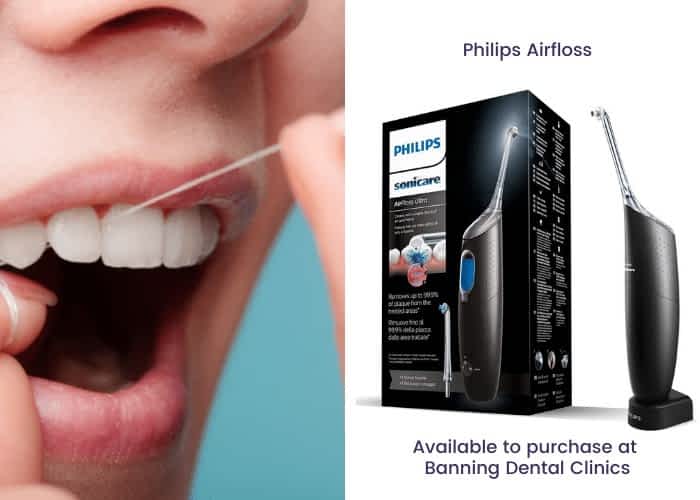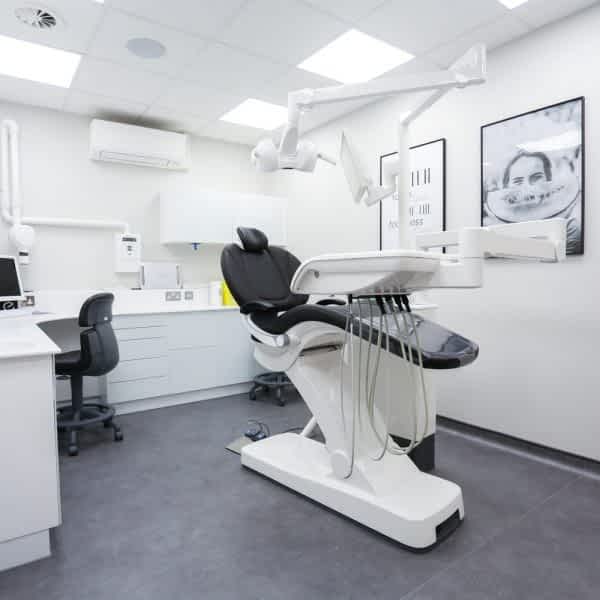
What’s all the fuss about water flossers?
Water Flossers seem to be the latest trend in dental gadgetry. It’s no great surprise given the rising interest in dental hygiene and aesthetics, but you might wonder what the fuss is all about and whether it’s time to jump on the bandwagon.
There is no denying that an annoying morsel of food, stuck awkwardly between two molars will provide hours of frantic frustration for the tongue. Even after thorough brushing, you will still find remnants of your last meal wedged firmly in place, that no amount of bristles, toothpicks or tongue thrashing will budge.
Aside from the annoying aspect of lingering food debris, the risk of tooth decay is rife between the gaps in our teeth. These minute spaces are a hot spot for the bacteria that causes plaque and decay and you won’t always be aware of what is there. This is why dentists are great advocates of interdental cleaning. Flossing provides the solution to reach the spots that a toothbrush simply cannot access. If you floss regularly and correctly you are reducing your chances of needing costly extractions or restorations later down the line.
Flossing as we know it today has been around for over 200 years, however, the concept is far more primitive than you might realise. Apes, the closest living species to humans, are known to floss using twigs and bark which suggests that this teeth cleaning method dates back to prehistoric times.
So since traditional flossing tools in the form of sticks, strings and tape have worked for millennia, what has led us to this evolution? Are you wondering whether a water flosser is for you?
Let’s take a look into the new world of water flossing and try to answer some of these questions.
What is a water flosser?
A water flosser, or oral irrigator as it was first labelled, emerged thanks to the combined expertise of a dentist and hydraulic engineer in 1962. The idea, similar to that of jet washing your patio was that high-pressure jets of water could blast away bacteria and dislodge particles of food wedged into hard-to-reach areas. If you’ve ever experienced the satisfaction of using a jet washer, you can see how this make sense.
The first models of water flossers were rather cumbersome and created as a tool for dentists to use on their patients. It’s only during the last couple of decades that their design has become more suitable as a hand-held home-cleaning device. Today you are likely to find them sitting alongside the electric toothbrushes in many major retailers and in the bathrooms of your friends and family.
Not all water flossers are the same. Like domestic coffee machines, there is now an extraordinary selection to choose from in a variety of sizes and with a range of features. Water pressure, charging options, reservoir capacity, tips, motors, and timers are all important factors to consider if you are thinking of making an investment in your dental hygiene routine.
What are the Pros and Cons of an Oral Irrigator?
Going by the market leader, Waterpik confidently claims that ‘the targeted stream of water removes plaque, food particles, and bacteria in a way that’s more effective, more comfortable, and easier than traditional string floss. The pulsating action also stimulates gum tissue for added health benefits.’
However, to understand the full picture of water flosser usage, we must look at the pros and cons objectively.
PROS
Easy to use
Compared to string floss, water flossing is easier and doesn’t require you to navigate large hands around a small mouth or fiddle with string. This is especially useful for those that suffer from arthritis or challenged dexterity and find floss strings a pain.
Convenience
You don’t need to look in the mirror or hold your mouth open wide at uncomfortable angles to be able to clean between your teeth. A water flosser can be used with your mouth closed.
Gets in hard-to-reach areas
Aside from the gaps between our teeth, an oral water jet can be particularly beneficial for brace wearers, non-removable bridgework and the backs of your mouth where food can become lodged between a tooth and gum flap.
Greater control
Maintaining a grip on a handle gives significantly better control and direction than a thin piece of string. Pressure levels can be controlled by settings according to personal preference.
Gentle on Gums
For those already suffering from gum disease, water flossers can help by flushing out the bacteria that sits beneath the gum line, unlike floss which requires some digging and scraping.
CONS
May not remove all plaque
There are too many variables such as the quality of water pressure and individual technique to categorically confirm whether an oral irrigator can effectively remove all plaque. Some studies suggest that a water flosser can remove 99% of plaque, but research is limited to specific brands and conditions and therefore cannot be confirmed across the board.
Cost
Ranging from £25 for a basic cordless model up to £100 for all bells and whistles, water flossers may seem a rather expensive alternative to floss string.
Messy
Water flossing can take some getting used to and if your technique isn’t right it can result in a fountain of water and saliva spraying all over the bathroom.
No scraping action
A water flosser is not able to mimic the scraping action that is achieved with a string flosser. This is important when trying to remove the tartar from the surface of the teeth.
Can a water flosser replace regular flossing?
There is no doubt that water flossing will enhance your existing dental hygiene routines, but whether it can completely replace regular flossing is a matter of division.
Water flossing is most definitely beneficial in the battle against, gingivitis, gum disease and bleeding. It’s less painful to those with sensitive gums and can help shift the bacteria from within the gum pockets.
It is also more convenient to use for those who struggle with dental floss or have braces, bridges or implants.
Some people like to use string floss first, to scrape and loosen plaque, followed by a water flosser to rinse out residue leaving an extra fresh feeling in the mouth.
Given the number of variables involved, it is always first worth consulting your dentist to find out whether a water flosser would be a good investment for your own oral health situation. Only then will you know for sure whether it can be used instead of or in addition to your regular flossing routine.








